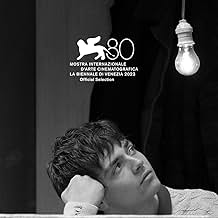Yurt
- 2023
- 1 Std. 56 Min.
IMDb-BEWERTUNG
6,8/10
1082
IHRE BEWERTUNG
Der zwölfjährige Ahmet ist am Boden zerstört, als sein neureligiöser Vater ihn in ein islamisches Wohnheim, eine Jurte, schickt, um muslimische Werte zu lernen.Der zwölfjährige Ahmet ist am Boden zerstört, als sein neureligiöser Vater ihn in ein islamisches Wohnheim, eine Jurte, schickt, um muslimische Werte zu lernen.Der zwölfjährige Ahmet ist am Boden zerstört, als sein neureligiöser Vater ihn in ein islamisches Wohnheim, eine Jurte, schickt, um muslimische Werte zu lernen.
- Auszeichnungen
- 15 Gewinne & 26 Nominierungen insgesamt
Esila Ergun
- Little Girl
- (as Esila Ergün)
Empfohlene Bewertungen
The story takes place in 1996 in Turkey, but the film is also a reflection on Turkey today, a very divided country, although the power dynamics has changed a lot.
The film fits many categories: a family drama, a story of class and religious struggle, a love story, and maybe most importantly a coming of age story.
The director was probably influenced by many films, one of them may have been Truffaut's 400 blows.
The relationship between Ahmet and Hakan is complex, beautiful and tormented. Contemporary films from Turkey are not afraid of addressing queer feelings and homophobia (Not knowing, Burning Days, and Black Night -Karanlik Gece-), and Yurt is a powerful contribution to this praise of sexual freedom.
The actors give an impressive performance and the photography is stunning. A real treat!
The film fits many categories: a family drama, a story of class and religious struggle, a love story, and maybe most importantly a coming of age story.
The director was probably influenced by many films, one of them may have been Truffaut's 400 blows.
The relationship between Ahmet and Hakan is complex, beautiful and tormented. Contemporary films from Turkey are not afraid of addressing queer feelings and homophobia (Not knowing, Burning Days, and Black Night -Karanlik Gece-), and Yurt is a powerful contribution to this praise of sexual freedom.
The actors give an impressive performance and the photography is stunning. A real treat!
If you only knew how sorry I feel for our children who experienced this and similar things. Unfortunately, things like this can still happen. Children who are sent to such dormitories for a purpose without even consulting their children may face many psychological problems throughout their lives. They always filter the events they experience through a religious filter and forget who they are. They lose their own character because they constantly shape their perspectives according to the moral values imposed on them. As someone who has many friends around him, like our main character Ahmet, and who has talked to people who have experienced such things many times, I was amazed. The director touched on the sensitive points so correctly that I felt like I had experienced these things. An incredible expression, so emotional. In my opinion, every viewer can find something from themselves in this movie... Congrats all the actors, especially precious director Nehir Tuna.
The movie makes us watch the panorama of Türkiye in the 90s. This panorama is so narrow, so cramped that it looks like it is inside a dormitory. Ahmet and Hakan are stuck like each of us, looking for freedom. There were parts where I watched with bated breath. Spoiler: The only part I couldn't understand was what was Ahmet's father's motivation for a radical change? Would it make a big difference if the movie showed us this? I don't think so. Definitely a must watch. The movie Yurt reminded me of this quote. "Yours is not despair, it's boredom. Everyone alive has hope." Everyone alive has hope. No matter what our choices are. Just like the action of running away, which Ahmet sees as a last resort.
Some films entertain, some impress, and a rare few reach directly into your life and show you a truth you hadn't yet found the words for. Yurt(The Dormitory), Nehir Tuna's hauntingly intimate debut, is one of those rare films. It is a quiet masterpiece-so precise in its storytelling, so understated in its emotion, and yet, somehow, so overwhelmingly powerful.
I watched Yurt and, for the first time in my life, felt as if a film had reached me not just as a viewer, but as a human being living through a particular place, time, and atmosphere. Every frame of this film breathes, pauses, and listens. It does not shout or beg to be noticed-it simply exists, fully and truthfully, in a way that feels more like memory than narrative.
The story follows a young boy sent to a religious dormitory, navigating the silence between belief and doubt, masculinity and vulnerability, discipline and desire. The setting-both literal and psychological-evokes suffocation, but never melodrama. Tuna's brilliance lies in his restraint. Instead of imposing judgment, he invites us to sit beside the boy, to see what he sees, feel what he feels, and above all, to remember.
Visually, the film is exquisite. The use of light and shadow is not just beautiful, but meaningful-it conveys everything that cannot be said aloud in this repressive environment. The color palette reflects the emotional state of its characters-faded, cold, sometimes harsh, sometimes warm enough to hint at the possibility of tenderness. Tuna has an exceptional eye, one that understands not only how to look, but when to look, and when to turn away.
What struck me most was how effortlessly the film communicated the complexity of growing up in a space where power, control, and religious ideology intertwine. There's no simplistic good vs. Evil here. Tuna treats each character-even the sternest authority figures-with a kind of compassionate distance. The dormitory itself becomes a metaphor for a society that demands conformity and punishes softness, but it's never reduced to just that. It's more than a symbol; it's a world-one many of us will find painfully familiar.
As someone who teaches a course on "Political Inclusion and Art" , It captures the nuances of our political and social reality without didacticism, without slogans, and with a depth that only great art can offer. It tells the story of a generation growing up under quiet, everyday pressures-expectations about who they should be, how they should feel, what they should believe. But it tells that story with care, patience, and immense artistic control.
Nehir Tuna is a filmmaker whose lens understands the youth of this country better than any political analysis. His gaze is not just observant, it is human. He does not dramatize suffering-he simply shows it, in its slow, real, and often invisible forms.
Thank you, Nehir Tuna, for making something so precise, so compassionate, and so needed. You've given us a story that lingers-and a silence that speaks louder than anything else.
I watched Yurt and, for the first time in my life, felt as if a film had reached me not just as a viewer, but as a human being living through a particular place, time, and atmosphere. Every frame of this film breathes, pauses, and listens. It does not shout or beg to be noticed-it simply exists, fully and truthfully, in a way that feels more like memory than narrative.
The story follows a young boy sent to a religious dormitory, navigating the silence between belief and doubt, masculinity and vulnerability, discipline and desire. The setting-both literal and psychological-evokes suffocation, but never melodrama. Tuna's brilliance lies in his restraint. Instead of imposing judgment, he invites us to sit beside the boy, to see what he sees, feel what he feels, and above all, to remember.
Visually, the film is exquisite. The use of light and shadow is not just beautiful, but meaningful-it conveys everything that cannot be said aloud in this repressive environment. The color palette reflects the emotional state of its characters-faded, cold, sometimes harsh, sometimes warm enough to hint at the possibility of tenderness. Tuna has an exceptional eye, one that understands not only how to look, but when to look, and when to turn away.
What struck me most was how effortlessly the film communicated the complexity of growing up in a space where power, control, and religious ideology intertwine. There's no simplistic good vs. Evil here. Tuna treats each character-even the sternest authority figures-with a kind of compassionate distance. The dormitory itself becomes a metaphor for a society that demands conformity and punishes softness, but it's never reduced to just that. It's more than a symbol; it's a world-one many of us will find painfully familiar.
As someone who teaches a course on "Political Inclusion and Art" , It captures the nuances of our political and social reality without didacticism, without slogans, and with a depth that only great art can offer. It tells the story of a generation growing up under quiet, everyday pressures-expectations about who they should be, how they should feel, what they should believe. But it tells that story with care, patience, and immense artistic control.
Nehir Tuna is a filmmaker whose lens understands the youth of this country better than any political analysis. His gaze is not just observant, it is human. He does not dramatize suffering-he simply shows it, in its slow, real, and often invisible forms.
Thank you, Nehir Tuna, for making something so precise, so compassionate, and so needed. You've given us a story that lingers-and a silence that speaks louder than anything else.
10By_ekizz
"Yurt" is one of the most quietly disturbing films I've seen in recent Turkish cinema.
It doesn't shout, it doesn't accuse - it simply watches.
What we see: a religious dormitory, modeled after the real-life.
What we feel: a subtle, almost invisible tension - the pressure to conform, to shrink, to obey.
The film never overstates its message. It trusts its audience.
It trusts us to recognize that these "disciplined" environments are actually machines - not for education, but for ideological shaping.
The scariest part? The best child is the one who speaks the least.
Yurt doesn't judge its characters, but it quietly exposes the system.
And that's what makes it powerful cinema.
This is a film that doesn't just disturb - it lingers.
It doesn't shout, it doesn't accuse - it simply watches.
What we see: a religious dormitory, modeled after the real-life.
What we feel: a subtle, almost invisible tension - the pressure to conform, to shrink, to obey.
The film never overstates its message. It trusts its audience.
It trusts us to recognize that these "disciplined" environments are actually machines - not for education, but for ideological shaping.
The scariest part? The best child is the one who speaks the least.
Yurt doesn't judge its characters, but it quietly exposes the system.
And that's what makes it powerful cinema.
This is a film that doesn't just disturb - it lingers.
Wusstest du schon
- WissenswertesYURT is a Turkish-German-French co-production.
Top-Auswahl
Melde dich zum Bewerten an und greife auf die Watchlist für personalisierte Empfehlungen zu.
- How long is Dormitory?Powered by Alexa
Details
Box Office
- Weltweiter Bruttoertrag
- 86.322 $
- Laufzeit
- 1 Std. 56 Min.(116 min)
- Farbe
Zu dieser Seite beitragen
Bearbeitung vorschlagen oder fehlenden Inhalt hinzufügen





















